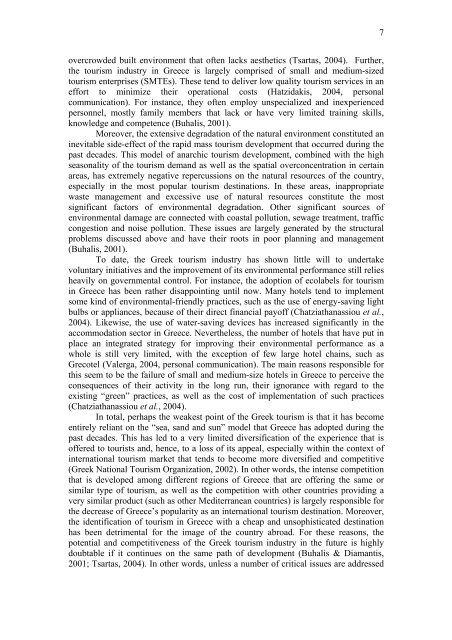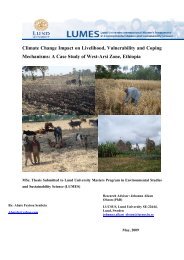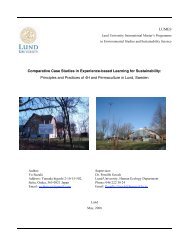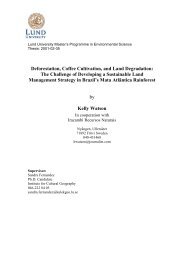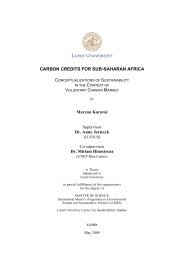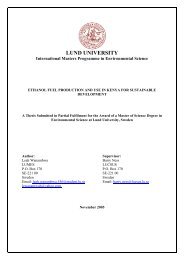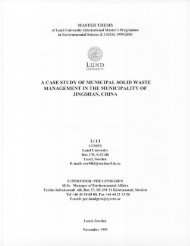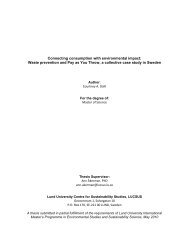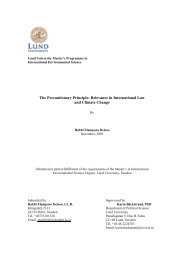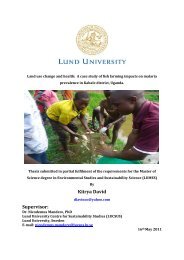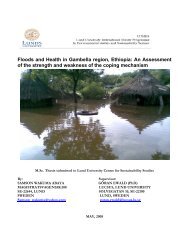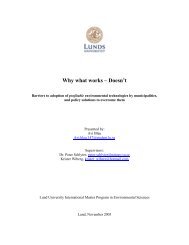Thesis title: âThe development of community-based ecotourism - lumes
Thesis title: âThe development of community-based ecotourism - lumes
Thesis title: âThe development of community-based ecotourism - lumes
Create successful ePaper yourself
Turn your PDF publications into a flip-book with our unique Google optimized e-Paper software.
overcrowded built environment that <strong>of</strong>ten lacks aesthetics (Tsartas, 2004). Further,the tourism industry in Greece is largely comprised <strong>of</strong> small and medium-sizedtourism enterprises (SMTEs). These tend to deliver low quality tourism services in aneffort to minimize their operational costs (Hatzidakis, 2004, personalcommunication). For instance, they <strong>of</strong>ten employ unspecialized and inexperiencedpersonnel, mostly family members that lack or have very limited training skills,knowledge and competence (Buhalis, 2001).Moreover, the extensive degradation <strong>of</strong> the natural environment constituted aninevitable side-effect <strong>of</strong> the rapid mass tourism <strong>development</strong> that occurred during thepast decades. This model <strong>of</strong> anarchic tourism <strong>development</strong>, combined with the highseasonality <strong>of</strong> the tourism demand as well as the spatial overconcentration in certainareas, has extremely negative repercussions on the natural resources <strong>of</strong> the country,especially in the most popular tourism destinations. In these areas, inappropriatewaste management and excessive use <strong>of</strong> natural resources constitute the mostsignificant factors <strong>of</strong> environmental degradation. Other significant sources <strong>of</strong>environmental damage are connected with coastal pollution, sewage treatment, trafficcongestion and noise pollution. These issues are largely generated by the structuralproblems discussed above and have their roots in poor planning and management(Buhalis, 2001).To date, the Greek tourism industry has shown little will to undertakevoluntary initiatives and the improvement <strong>of</strong> its environmental performance still reliesheavily on governmental control. For instance, the adoption <strong>of</strong> ecolabels for tourismin Greece has been rather disappointing until now. Many hotels tend to implementsome kind <strong>of</strong> environmental-friendly practices, such as the use <strong>of</strong> energy-saving lightbulbs or appliances, because <strong>of</strong> their direct financial pay<strong>of</strong>f (Chatziathanassiou et al.,2004). Likewise, the use <strong>of</strong> water-saving devices has increased significantly in theaccommodation sector in Greece. Nevertheless, the number <strong>of</strong> hotels that have put inplace an integrated strategy for improving their environmental performance as awhole is still very limited, with the exception <strong>of</strong> few large hotel chains, such asGrecotel (Valerga, 2004, personal communication). The main reasons responsible forthis seem to be the failure <strong>of</strong> small and medium-size hotels in Greece to perceive theconsequences <strong>of</strong> their activity in the long run, their ignorance with regard to theexisting “green” practices, as well as the cost <strong>of</strong> implementation <strong>of</strong> such practices(Chatziathanassiou et al., 2004).In total, perhaps the weakest point <strong>of</strong> the Greek tourism is that it has becomeentirely reliant on the “sea, sand and sun” model that Greece has adopted during thepast decades. This has led to a very limited diversification <strong>of</strong> the experience that is<strong>of</strong>fered to tourists and, hence, to a loss <strong>of</strong> its appeal, especially within the context <strong>of</strong>international tourism market that tends to become more diversified and competitive(Greek National Tourism Organization, 2002). In other words, the intense competitionthat is developed among different regions <strong>of</strong> Greece that are <strong>of</strong>fering the same orsimilar type <strong>of</strong> tourism, as well as the competition with other countries providing avery similar product (such as other Mediterranean countries) is largely responsible forthe decrease <strong>of</strong> Greece’s popularity as an international tourism destination. Moreover,the identification <strong>of</strong> tourism in Greece with a cheap and unsophisticated destinationhas been detrimental for the image <strong>of</strong> the country abroad. For these reasons, thepotential and competitiveness <strong>of</strong> the Greek tourism industry in the future is highlydoubtable if it continues on the same path <strong>of</strong> <strong>development</strong> (Buhalis & Diamantis,2001; Tsartas, 2004). In other words, unless a number <strong>of</strong> critical issues are addressed7


